I might be a little addicted to YA books about fandom. It’s a relatively new subset of the contemporary genre, though I wrote about one such ill-fated effort on this very blog some while back. At the time, that book just about stood alone, and was all the more disappointing for it–I wanted books that tried to reckon with the fandom experience, that captured what it felt like to be a teenager neck-deep in the Internet, in video games, in D&D and SFF and anime/comic book conventions. Imagine my surprise when Rainbow Rowell’s FANGIRL came out that same year, and–shortly thereafter–more and more books about nerds trying to cope with both their offline and online lives.
Unsurprisingly, most of them haven’t been terrifically satisfying. More often than not, these books are your average teen rom-coms with a bit of nerd dressing thrown in for conceptual flavor. Strip away the con setting or the fic writing, and in most cases you’re left with the same boy-meets-girl story you’ve already read a million times before. That’s not automatically a bad thing: a book doesn’t need to reinvent the wheel, plot-wise, to be enjoyable or meaningful. But most of these books aren’t really about the fandom experience. By and large, they don’t capture the intensity that comes from taking your favorite thing a little too seriously–or the friendships you make and break in the process.
Admittedly, some come closer than others. And a few are boy-meets-boy or girl-meets-girl, too, which is at least a welcome variation on the theme. But I have yet to find the one book in this burgeoning sub-genre that really speaks to what I’ve been through–what I went through, as a teenager who spent way too much time on the Internet, who slipped fantasy novels inside her textbooks to read during class, who was obsessed with anime and comics and RPGs and writing massive, terrible fics. A couple of these books do speak to the power (and pain) of internet relationships, but so far none of them have really captured the weird, surreal essence of being Extremely Online. That experience is more all encompassing and strange than ever, given the absolute ubiquity of social media–whether you’re a ‘nerd’ or not. It’s isolating and welcoming all at once; a warm bath and a cold shock. You might think I’m looking in the wrong place. But YA is capable of good things, even great things. Sometimes.
Anyway, let’s dive into this morass.
1. GEEKERELLA; ASHLEY POSTON
☆☆☆☆
Imagine Cinderella, except the ball is a cosplay event at a convention, one of the cruel step-sisters is gay and not so cruel, and the prince is a hot actor who’s come to take up a legendary role in a massive sci-fi franchise beloved by the super-fan protagonist. No fairy godmother, though–just a quirky co-worker with a pumpkin-themed van.
Although not perfect by any means, this book stands as my favorite among the passel of fandom fiction I’ve read over the past couple of years. There’s a lot going on, concept-wise, in that it’s both a pretty straightforward fairytale retelling AND a story about how
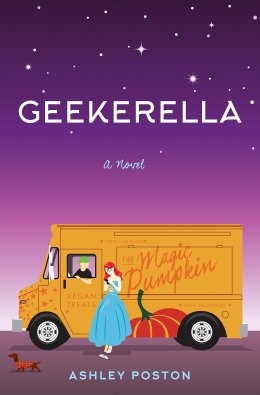
deeply fandom can impact a person’s life and identity. Ella was born into it: her mother and father so loved Starfield (the Trek-alike sci-fi show that serves as the center of the book’s fandom) that they started a convention for it, one which began as niche-specific and which eventually grew to near Comic Con proportions. Of course, this being the particular tale it is, Ella has never experienced the con as an adult: her father died when she was a child, and her mother before that. Thus, she’s left with a cruel, image-obsessed stepmother and two stepsisters, one hateful and one who’s just kind of passively trapped in the cycle of dysfunction created by the rest of her family.
Meanwhile, Prince Charming is a rising young actor named Darien who was just cast–much to Ella’s dismay–as the leading man in a reboot film of Starfield. On-screen, he’s a teen soap hunk, seemingly vapid and questionably talented–but in truth, he’s just a hot nerd who got discovered (and more than a little pushed by his selfish stage dad). He’s desperate to do right by the film and the fandom, and truly anxious when Ella writes a viral blog post decrying his casting. He and Ella strike up a conversation due to a case of mistaken identity: he texts her father’s old phone regarding the aforementioned con, and Ella, having just inherited this phone, intercepts it. Thus the meet-cute-text begins, with a big sword of Damocles hanging overhead: neither of them know who the other one really is. Ella offers her name, but her blog handle is ‘rebelgunner’, and Darien simply styles himself as Carmindor, the character he’s preparing to play. Cue heartfelt talks, blurry photos, and complications that strain each character’s self-confidence, all culminating in the fateful, fated meeting at the con.
For my part, the most important part of a story, any story, comes down to the characters. They don’t have to be good people–it’s often better if they’re not–but I have to like them. I have to find some connection to them, some sense of authenticity in who they are and who they’re trying to be. And even if it doesn’t or can’t get that deep, they should, at the very least, be intriguing, or charming–in other words, they should be someone I’d really like to get to know. I found that in this book. There’s warmth here, and sincerity, and also actual chemistry between Darien and Ella’s texts. Some might take issue with how the romance develops primarily OVER text–they don’t meet in person until the end of the story–but for me, that’s just another element of the fandom experience. I’ve fallen for so many people via text alone, and I know I’m not unique in that. The exchanges between characters felt funny and real, and mirrored the way I’ve seen the best online friendships develop. Starting light, starting with jokes, feeling each other out, followed by the slow but sure realization that this person, through words alone, really lights up your day. You want to know more, and maybe you want your friendship to BE more, but you still have a whole other life to attend to–and maybe this person, friend or something else, can’t so easily slot into it.
Like I said, though, it’s not perfect. Once the story finally gets everybody to the fabled convention and all the threads converge, the book goes into wish fulfillment overdrive. That’s not necessarily a bad thing, especially not given this book’s demographic (and likely readership), but the final scenes of sweet revenge feel more treacly than triumphant. The whole thing would make a REALLY excellent DCOM*, though.
(that’s ‘Disney Channel Original Movie’, for the uninitiated commoner)
2. SCARLETT EPSTEIN HATES IT HERE; ANNA BRESLAW
☆☆☆
Genre and themes aside, this book is funny. It’s not often that I physically laugh out loud when reading anything (even David Sedaris usually just elicits droll chuckles), especially not a YA book (as they tend to be charmless humor deserts, especially if we’re wandering the dark lanes of SFF), but Scarlett cracks wise like a seasoned stand-up comedian.
To wit:
“Hey, Divider [a bully character’s nickname for Scarlett]!” She smiles a big, toothy smile at me. “How excited are you for the dance!”
“Not going,” I mutter, shuffling backward to let her in.
“Why? Too lame for you?”
“I’ve got plans later!” I sardonically try to match her bright tone.
“Whatcha doing?”
“I’m being executed by the state!”
Later:
This is the part where I am supposed to be a sparkling, vindictive angel of revenge whose cutting remarks make him feel like shit.
“I like your shoes,” I blurt.
So, without getting into anything else, I can tell you at least that this book overcomes the first and greatest hurdle of most YA–of most books anywhere, honestly. The protagonist has a voice. Depending on your taste in protagonists, that voice might grate or it might delight, but it’s specific. It exists. So that already pulls this book ahead of the pack, at least for me, because I did for most part find Scarlett delightful. She’s a hardscrabble teenager
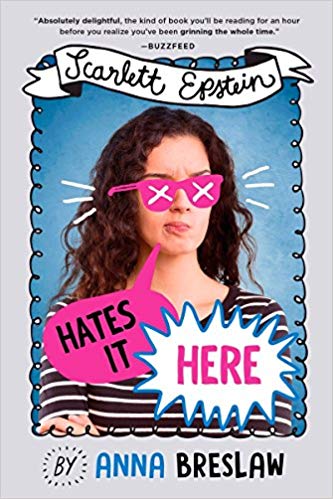
obsessed with a show called Teen Wolf Lycanthrope High, recently ended. She’s miserable for its loss; writing fic and hanging out with other well known writers in the fandom provided her only escape from an otherwise deeply unsatisfying life: her parents are divorced, her mother’s all over the place, her dad’s off in his new life, and school isn’t much better. There’s much made of the class disparity between Scarlett and the other kids; she’s not impoverished, but she’s certainly lower middle class, and she feels like nobody ever lets her forget it. Her mom cleans houses for a living, and while her dad’s life is quickly becoming more glamorous down in NYC, that life is not her life.
Thus: fandom is the balm. The respite. As in most of the other entries to this genre, the fandom aspect is important but it’s not really the kind of all-encompassing experience I’m still hoping for. Most of these books are structured like this: protagonist has some kind of deep nerdy fandom interest, whether it’s a TV show or cosplay or their own original work, and this interest sustains them as they navigate the difficulties of their actual lives. That’s well and good. But, for many of us kids who are and were real deep into the online thing, the ratio in these books is all off. The fandom themes are buttercream on a tasteless cake. Scrape them off with a knife, and–as mentioned–you’re typically left with the plot of an average YA contemporary romance. If you’re neck-deep into Teen Wolf or Star Trek or (coughs) Final Fantasy, then the percentage ratio of fandom activity to offline activity is not 30/70. It’s 70/30. You attend to your earthly body and its duties because you must, but you take any opportunity to be away from them, to be nestled safely back within the world that seems, for the moment, to know who you are.
Scarlett’s fanfiction and the community around it are important to her, but she’s really twisted up over her hot guy and girl bully problems. Problems which she then sublimates INTO her fanfiction, to the ultimate joy of absolutely nobody. The book includes this as a story-within-a-story, and it’s an interesting conceit, albeit risky. Much like with the shitty poetry and overwrought fic featured in GENA/FINN, Scarlett’s efforts are just not that great (though I will say: they are better). And they have nothing to do with fandom or the show she was so fixed on, either; in essence, she took a small android-related plot thread from that show and used it to start writing more or less original fiction. So the fandom aspect morphs quickly from being about this oasis of a TV show into Scarlett dealing with her fandom friends turning into her own PERSONAL fandom. Admittedly, the foibles of such a thing are well represented, right down to the fussy ship wars and the hard-to-hear criticism from a wiser friend. But it all remains rooted very firmly in reality, not in that strange ethereal space of far-away friends, of stories you just can’t get out of your head, of passion and obsession that boils over and scalds.
Opinion will be (and is, judging by the reviews I read) divided on Scarlett herself. She’s acerbic, sardonic, self-involved. She’s smart but she’s lazy, and that’s a label I’d apply to the book as a whole. For example, there are feeble efforts towards notions of diversity and intersectionality–Scarlett’s closest confidant is an old woman who we offhandedly learn is a lesbian, though that status has no real bearing on anything–and there are jokes about the oppression of straight white men (Scarlett’s father basically IS a joke about the oppressed straight white man). But then the book comes back with lines like:
Wow. Oh. Okay. In the ten-minute-mile run of sexual activity, she’s a varsity cross-country jock and I’m a fat kid at this point.
Super enlightened. Stuff like this frustrates in and of itself, but also because it keeps trying to slyly posit itself as ‘woke’ in some way, as in tune with all these issues of social justice. All that progressivism the kids are real into these days. If you want to intersperse some genuinely funny observations with the kind of tired, punch-down humor you WOULD find at the average comedy set, that’s fine, I guess. But it just rings twice as false when you mix it in with disingenuous liberal posturing. That brings me to both the most compelling and disappointing aspects of this book: for the most part, Scarlett doesn’t get away with shit. She’s called on her self-absorbed behavior. She’s forced to grow. She has to think her way through her decisions, and more importantly, she has to take real action to move forward from them. That’s great, truly it is. But the story falls flat during the showdown between Scarlett and her prime bully, Ashley–a girl that Scarlett reimagined for her fic as a literal teenage sexbot. Now, Ashbot gets a happy ending. In fact, Scarlett is ultimately much more empathetic and generous to her initially cruel idea of Ashley than she ever is to Ashley herself. They have it out a little bit, though, in the bathroom, and it seems like maybe there’s potential for understanding–but then the thread’s dropped. There’s a brief mention of Scarlett planning to apologize and ask to hang out, but their last conversation was so thorny and angry that I really wanted to see how that effort was going to go. But that might just be personal preference talking. Girls vs. girls is still way too prevalent in YA, and I will thirstily reach for anything that suggests we are trying to move past it.
In any case, as a piece of fandom fiction it’s not a great example of ~the experience, but–like FANGIRL–it’s a fine piece of contemporary YA.
3. FANGIRL; RAINBOW ROWELL
☆☆☆
Released in 2013, I think of FANGIRL as a seminal point in this particular YA niche. It wasn’t the first book released of its kind, and it’s not the best, but it got people talking–and that’s what paves the roads. Many of the books on this list and in the sub-genre generally are marketed as ‘for fans for FANGIRL’, and reviewers often draw their own comparisons, besides–thus enforcing its place as the ur-novel of fandom fiction.
FANGIRL is about Cath Avery, a BNF for the Simon Snow series, a Harry Potter-style franchise of books about a boy wizard tasked with saving the world from incredible evil while attending a magic school (and evading his sly nemesis, a Draco-in-Leather-Pants type named Baz). She’s writing an epic fan-conclusion to the series that gets thousands of hits and comments each day, and her popularity is such that readers buy and wear t-shirts emblazoned with the name of her story (Carry On, Simon).
Cath’s life revolves around Simon Snow and her fanfiction, and she doesn’t appreciate the many distractions that come with adjusting to her freshman year of college. First, her twin sister (and writing partner) doesn’t want to live together. Her new roommate is a saucy badass that’s never even heard of the word ‘fandom’. The roommate’s best friend / not-boyfriend is always hanging out and smiling at Cath all the time. Her fiction professor disdains fan work. Her father is a mess; her mother, barely in the picture. Fangirlin’ ain’t easy.
I heard about this book through Tumblr, and saw a number of people praising it for including an awkward nerd girl, steeped in fandom, as the protagonist. While I’m strongly in favor of stories about awkward nerd girls, the fandom aspect was not
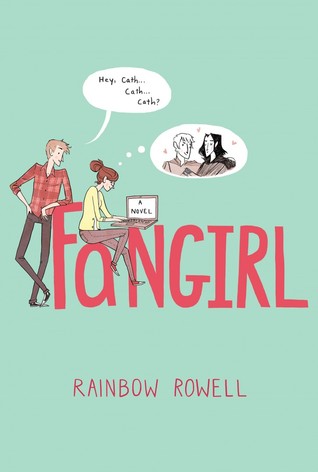
precisely as advertised. This is a gentle love story, a warm family drama, a coming of age story with a strong beating heart. The characters are great: not perfect, but Rowell’s empathy for them shows through in every line (only the pretentious jerk from Cath’s writing class fell a little flat, but he served his purpose). And Simon Snow does dominate Cath’s thoughts; she returns to it and to her own fic for it as means of comfort and reassurance throughout her awkward transition into freewheeling college life. But this is not a book about fandom. Cath’s online community intrudes on the story only very rarely–there’s reference to reader comments here and there, and there are excerpts both from Cath’s fic and from the books they’re based on (so you effectively get two patchwork stories-within-a-story here, which can be a little much to keep track of), but these asides are just that–they exist in isolation, not strongly woven into the fabric of Cath’s life. She’s an authentic fangirl, to be sure, but this is not a story about the experience of growing up online–or about relying on those communities and experiences to carry you through your actual life. Cath manages her offline problems just fine, and does so under her own power. She’s a charming character, surrounded by other equally charming characters–from the genuinely good (maybe even TOO good–there’s not much to him beyond his handsome farmboy wholesomeness, but hey, it’s a rom-com, so that’s fine) Levi to the rough-around-the-edges but ALSO genuinely good roommate, Reagan. These people are all fine, and I liked reading about them. But they mostly look askance at Cath’s online activities, even though Levi very sweetly asks Cath to read her fic to him.
Most of the real engaging stuff comes from Cath’s family troubles, though. She’s grown distant from her twin sister and she’s constantly worried about her father, a kind man who suffers from sometimes debilitating mental illness. Her mother doesn’t figure in: she left the family years ago, and besides one tense meeting, this wound is never fully addressed. It’s IMPLIED that Cath addresses it through writing, but we never get more than bits and scraps of her work. These bits–her piece for fiction writing, her own fic, etc–are good, but they’re also not appreciably different from Rowell’s actual writing. Neither are the inserts from the actual Simon Snow books. Like I said, it can make for a slightly confusing soup, but the flavors are enjoyable, nevertheless.
The story has a just an ounce of anxiety over the fact that Cath’s a straight girl writing about gay boys, but it’s not examined thoroughly: just the subject of a few nervous jokes. It’s a topic worth considering, but if you’re not really going to consider it, maybe better to just slide on by, huh?
Other than those quibbles, I liked this book. As YA contemporaries go, it’s more than solid. But it’s not really about fandom as I understand it, not about the community of fandom, not about the way an online world can feel just as pervasive and urgent as the world offline. Cath’s fic writing is important to her, but the story is really about her growing up and growing beyond it–into ‘real’ writing and ‘real’ life. It’s a quiet message, not delivered maliciously, not disrespectful. But it’s not quite what I’m looking for with this type of story.
(As a final aside, Rowell later wrote an actual book of Cath’s fic, called Carry On, and I did enjoy that IMMENSELY. EXCITED FOR THE SEQUEL.)
4. GENA/FINN; HANNAH MOSKOWITZ & KAT HELGESON
☆☆
This is the book that most closely captures the experience of online friendship/fandom, and that’s because it’s epistolary, comprised almost entirely of exchanges between the two protagonists. The story unfolds over text messages, PMs, blog posts, emails, and ultimately a few physical letters also. I was entirely with this book during its first half: you’re thrown right into the excitable fandom for a fictional cop procedural called Up Below. Actual details on the show are scant, but it features a strong, contentious relationship between its two attractive male leads and that’s all anyone cares about. Somehow everyone interprets these two as just intensely fraternal, but the rest of it is true to form, at least. From what little I gathered, the show is basically a fantasy-free cop AU of Supernatural, except Dean and Sam aren’t actually related (but still nobody writes fics about them banging each other? Look, it just sounds fake) and there’s no Castiel etc.
I was mostly with this book for all of its first half. Gena is a popular fic writer who eventually connects with Finn, a lesser known but still talented fan artist. Blog posts include commentary on the show along with pieces of Gena’s fic and Finn’s art, and that’s fine–it’s great, even–but it’s all so vague and twee that I had a difficult time caring. It’s clear that Gena, in particular, has built her life around this show and these characters, but because we know so little about this fake franchise and the actual fandom activities reveal nothing salient, it’s hard to see what makes the whole enterprise meaningful. On the one hand, barely comprehensible screeching and pretentious drabbles about how
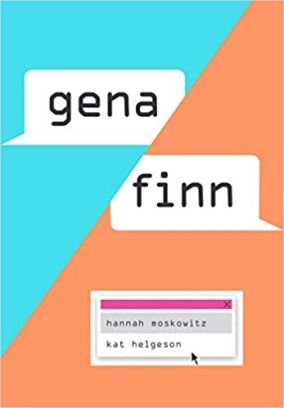
much x cares so fucking much for y that he’s ready to die from it are EXTREMELY authentic. On the other hand, I wanted a little more context for all of this to really hit home. Still, I liked what the book was trying to do–at least until the second half. At that point, everyone goes to an Up Below convention and the plot does a nosedive off of the rails. The relationship between Gena and Finn escalates, and the rising tension does sharply evoke the intensity and confusion of a powerful fandom relationship. But the plot twists are maudlin and distracting, and by the end I felt the whole thing was just a little too overheated. Gena, in particular, is more of a manic pixie sadness girl than a satisfying character; she’s every beautiful and talented and broken OC you’ve ever seen on the internet, except instead of pretentious witch powers there’s a lot of nonsensical free verse poetry instead. She simply does not talk or act like a real person.
Finally, though this book is marketed as being LGBTQ, it’s remarkably shy about committing to any such relationship. Finn has feelings for Gena, though we’re never sure if they’re reciprocated (this is partly because Gena is nigh incapable of speaking or writing in anything but ‘poetic’ near-gibberish). The ending is hopeful–or you’re meant to take it that way, presumably–but uncertain. And, as mentioned, it’s weird (read: unlikely) how the cop drama that serves as the fandom backdrop seems to have a fandom entirely free of slash.
Ultimately: unsatisfying.
5. DON’T COSPLAY WITH MY HEART; CECIL CASTELLUCCI
☆☆
If I judged books solely by the cover/title, this one would be right out. ‘Cosplay with my heart’ is a vile pun, even among the vulgar annals of punnery. But I sallied forth, and found a story that was … mostly innocuous, really. The protagonist is a teenager, in high school I’m fairly sure, but because of the writing I often get more of a middle school impression. Edan reads like an adult’s impression of a young person; her thought process skews so much into immaturity that she doesn’t often feel organic or true. I’ve spent a lot of time with teenagers, and they’re capable of pretty complex sentences. Complex
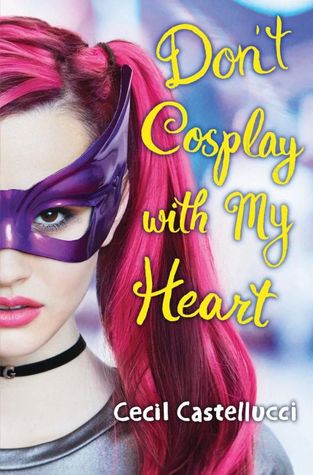
emotions, too. Edan’s experiences feel like they’re often filtered through a lens designed for very young children. She suffers from a relatable plight: frustrated with her growing pains (crushes on boys, shifting family dynamics, friendships changing due to circumstances beyond her control), she relies on her favorite comic book character as a source of strength and empowerment. As a theme, it’s pretty solid, but good intentions do not necessarily result in a good story.
Parts of it were strongly affecting, and the basic messages are important for young nerd girls to hear–especially the central point about what makes someone a ‘real’ fan /geek/etc. But I can’t quite tell who the demographic is here–the prose is too simplistic to satisfy the average high schooler, so maybe it’s meant for the middle grades? I wouldn’t call it a YA book. There’s not really an ounce of subtlety in what the book is trying to do, and though one of the meta-fictional asides talks about how no one is all good or all bad, the villains of this story (shitty teenage boys, the dark spectre of many a young girl’s story) are pretty clear-cut.
Furthermore, I read an uncorrected proof, but the prose was really quite rough. Like I said, some sections have solid emotional heft; there are moments when the spare, declarative style really works. But there’s a lot of awkward, jarring sections, too–and tons of simple mechanical errors. Hopefully all fixed in the final edit, which I see lately whenever I get to a bookstore.
6. ELIZA AND HER MONSTERS; FRANCESCA ZAPPIA
☆☆
If you’re as deep into the YA ‘scene’ as I am, you might be wondering why such a well-received book is so far down the list. Truth be told, I was just as excited as the next anxious nerd when I first read the synopsis. A protagonist who sustains herself via an online community of her own making? A story about a girl who’s famous to everyone except the people who know her real name? I’m all about it. Like many others who read this book, I saw a lot of myself in Eliza: her high school experience didn’t exactly mirror mine (I’ve said that most of these stories boil down to a simple romcom plot, and that’s true here too, except sans any attempt at humor), but some of the beats felt awfully familiar.
Eliza writes and draws a tremendously popular webcomic, Monstrous Sea. This thing is a juggernaut. Within the first few pages, you learn that Eliza’s constantly fending off book deals, that her merch sells out instantly, and that she has literally millions of readers. I’m hard-pressed to think of a real world comparison–Homestuck alone, probably. She makes enough money from her readers for a healthy college fund, too. Her vast community has fanartists, fic writers, and I’m sure all manner of other things–though
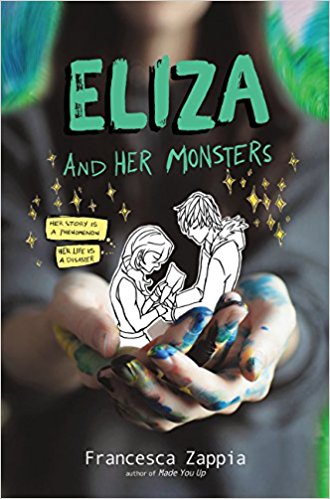
she participates in her own fandom under an alternate screen name, we don’t really see its full scope represented (which is a shame, because if you’re gonna write about someone with a Homestuckian following, you have a real opportunity for some batshit stuff). But! To her family and her classmates, she’s just a nervous Nelly nobody. Eliza is crippled by social anxiety, and the mental health aspect of the book is authentically represented. But most every character outside of Eliza herself is a shallowly drawn caricature, and that includes Wallace, her inevitable love interest. The twist here is that Wallace is a popular fic writer for Monstrous Sea; in fact, he’s transcribing her story into novel form, and everyone loves it.
Despite Wallace’s prominence in Eliza’s fan community, however, we’re meant to believe that he doesn’t IMMEDIATELY clock her as the author of Monstrous Sea once he transfers to her school and they meet. Not to say he should have some kind of sixth sense about her, but he sees her fucking sketchbook. The narration tries to explain this by saying it’s just sketches in there, as though any fan worth their salt wouldn’t be able to recognize a favorite artist’s sketch work versus a finished piece. COME ON, SON. It’s just such a flimsy deception, and it goes on for WAY too long. The book demands suspension of disbelief on every level, which might be fine if we were actually dealing in fantasy. But, ostensibly, we’re not, not even in a surrealist sense–the plot is dour and melodramatic, and only becomes more so as it reveals miserable facts about both Wallace and Eliza. Also, while Eliza is supported by her fandom friends, they ALSO don’t know who she really is, thus creating the same layer of distance and deception as in her relationship with Wallace (also, it’s kinda fucked up to insinuate yourself into a group of people who spend their time discussing your work while purposefully never revealing yourself as the creator–something that’s never really thoroughly addressed). Consequently, the fandom experience here is applied with just a slightly thicker sheen than in FANGIRL, which disappoints; as I said, managing a following for a webcomic of MS’s size would be, well, monstrous.
I liked the core premise of this book, and I know it spoke true to a lot of us folks who spent our high school years (and also our, uh, present years) sequestered in our rooms, making up stories and chatting online. But it just didn’t resonate.
7. ALL THE FEELS; DANIKA STONE
☆
I won’t lie to you–the title alone made me cringe. Far worse than ‘Cosplay with my Heart’. But I’m one of those fun-hating curmudgeons who doesn’t much like ‘feels’ as a term; it’s just too twee in my mouth.
Still, I recognize: a minor and subjective sin, easily redeemed by the book itself. Unfortunately for me, that title turned out to be a warning sign.
Our story stars Liv, a college freshman recently crushed by the death of her favorite fictional character–Matt Spartan, a hardcore space commando type whose Starveil franchise reads like the gritty Star Wars/Star Trek lovechild that everyone knows they don’t really want. Granted, this is one of those books where we learn only the most basic details of the thing Liv’s so fixed on, because the true object of her desire is simply the idea of this character. Details about his world, his psychology, his history, his relationships, and so forth–you get a little trickle, but for the most part (a problem in many of these books), I have no idea what draws Liv to this story so powerfully.
We begin as Liv’s life ends: in the movie theater, the credits and tears rolling. I had some optimism for these initial paragraphs. Every story ends, eventually, at least in its official capacity. Few franchises last forever, and even if they do, few characters stay alive for the full length of the ride. Those losses are often the grist for the fandom machine. In fic and art, your fave never dies.
But that first shock of loss can be tough. Even casual fans cry at certain movie deaths; tragedy is tragedy, and it’s affecting.
Unfortunately, Liv quickly establishes herself as the most noxious kind of fan. Her behavior in the opening scene sets a tone that is, perhaps admirably (???) carried throughout: she’s a whining, narcissistic brat. Her quiet weeping turns to all-out wails. She yells at her improbably beautiful and patient best friend, Xander (more on him later), at the now silent and blank movie screen, and worst of all, she also screams at the “pimply teen sweeping popcorn” who simply asks if she’s okay.
It’s a full-on tantrum, it’s horrifying. Everything about the book is this way–outsized,
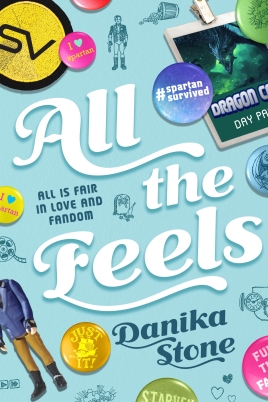
artificial, and shallow. Big sentimentality is not big sentiment, especially when the narrative only cares about the protagonist to any significant degree. Liv is the only character we truly come to know, and she’s fucking insufferable. Her mother is a whimpering piece of cardboard with a dull-eyed, one-dimensional killjoy of a boyfriend. Xander looks like he stepped right off of a romance novel cover but acts like That Guy in your graduate class who thought it’d be oh-so-beguiling to unfold an entire 19th century tea service across the middle of the discussion table in your postmodern theory seminar while strutting around with fluttery velvet coattails and a gold-tipped cane.
(Maybe only I knew that guy. But he was a jackass.)
Xander’s girlfriend is just a hot ‘normal’ chick for Liv to needlessly hate–her primary flaw is that she’s just TOO friendly, and her great offense is that she does her damnedest to get Liv out and involved with the world, much to Liv’s deep horror.
Liv herself is an anti-social shut-in who loves one (1) fictional man, and she might be projecting a bit because her dead father loved this franchise, too–a plot point that echoes Geekerella, but drawn with far less poignancy, because we don’t end up knowing a damn thing about the dead father, either. Liv is a vidder, and she uses those skills to start making short films that suggest her fave fella is actually still alive, in a move that the author admits came from the whole #CoulsonLives movement on Twitter. As a premise, it’s really not bad.
But the execution is just such a slog. Liv treats everyone around her badly, and the narrative constantly excuses her for it. When she finally agrees to go to DragonCon and meet her idol, he hates her–because he wanted out of his Starveil contract, because he wanted to move on with his life. Liv’s shattered, and that part is understandable. You want to think that everyone involved in making this thing you love also loves it in the same way you do. But that’s not a realistic expectation, and I thought for half a second that the book might redeem itself and deal with this. But no. It doesn’t. The actor’s anger is never satisfactorily resolved, and if you’re wondering whether or not Liv’s campaign to revive the character and franchise succeeds, well, just think of the ending that most enforces gross fan entitlement and there you have it. It’d be one thing if the actor was enthused or even desperate to have the character back, too, but it’s very clear that he felt Liv was ruining his life–until she wasn’t? It’s a mess.
Listen: it’s fine to have an unlikable main character. Great, even. Refreshing, some may argue. But, as with GEEKERELLA and the father plot point, SCARLETT EPSTEIN handles a jerk protag with much more self-awareness and grace. Liv NEVER grows. She’s coddled both by the other characters and the narrative itself, and while the former might be understandable, the latter is not acceptable.
Meanwhile, Xander has obviously been in love with Liv for AGES, despite his girlfriend–who randomly dumps him halfway through the story. There’s also a little aside about Xander being bi and Liv being ‘okay’ with it, kind of uncomfortably so. It’s a weird little footnote that seems to only be there for diversity points. Just thoughtless–which aptly describes this book as a whole.
Last point of contention: Liv meets up with her online friends at the con, a weird bunch that I might have liked to know better. Except that they’re described in very oddly contemptuous terms. Much is made of Liv’s own rubenesque, ‘wrong century’ figure (a phrase I find concerning, because although it’s meant to soothe, it really just emphasizes that less-than-thin bodies are abnormal and ‘out of time’), but much is ALSO made of how one fandom friend has ‘sausage fingers’. Another is so socially anxious that she can’t speak aloud and has to communicate by text; another is a man so intense that he’s escorted somewhere by security at some point … just a bunch of caricatures. Again: thoughtless. Ugh. TAKE IT AWAY.
HONORABLE AND DISHONORABLE MENTIONS:
QUEENS OF GEEK, Jen Wilde: Heavy-handed, but it’s got its heart in the right place. ACTUAL LGBTQ representation, sweetly done. An honestly painfully accurate depiction of anxiety. If you like stories about cons + vloggers + more pop culture references than I can possibly be fucked to remember, give it a shot. ☆☆☆
BOOKISHLY EVER AFTER, Isabel Bandeira: A girl obsessed with YA SFF lets her badass heroines dictate her life. Cute premise, but basic in every respect. ☆☆
LOOKING FOR GROUP, Alexis Hall: An M/M romance where the two leads meet via World of Warcraft (excuse me–Heroes of Legend). My jam, tbh, albeit a little soapy. ☆☆☆
GRACE AND THE FEVER, Zan Romanoff: A book for anybody who cared about whether or not those two guys in that one boy band were secretly banging each other. In other words, not me. Still, the writing was lovely. ☆☆☆☆
THE GEEK’S GUIDE TO UNREQUITED LOVE, Sarvenaz Tash: Hopeless and hapless nerd dude tries to woo his long-time BFF at NYCC. Another good DCOM candidate. ☆☆☆
AFTERWORD:
I didn’t cover every book in this brave nerd world–some of them were too eminently forgettable to mention, and many more I just haven’t read yet. If you’ve also found yourself fixated on this particular flavor of YA, let me know what I’m missing, so I can beg/borrow/steal it.
